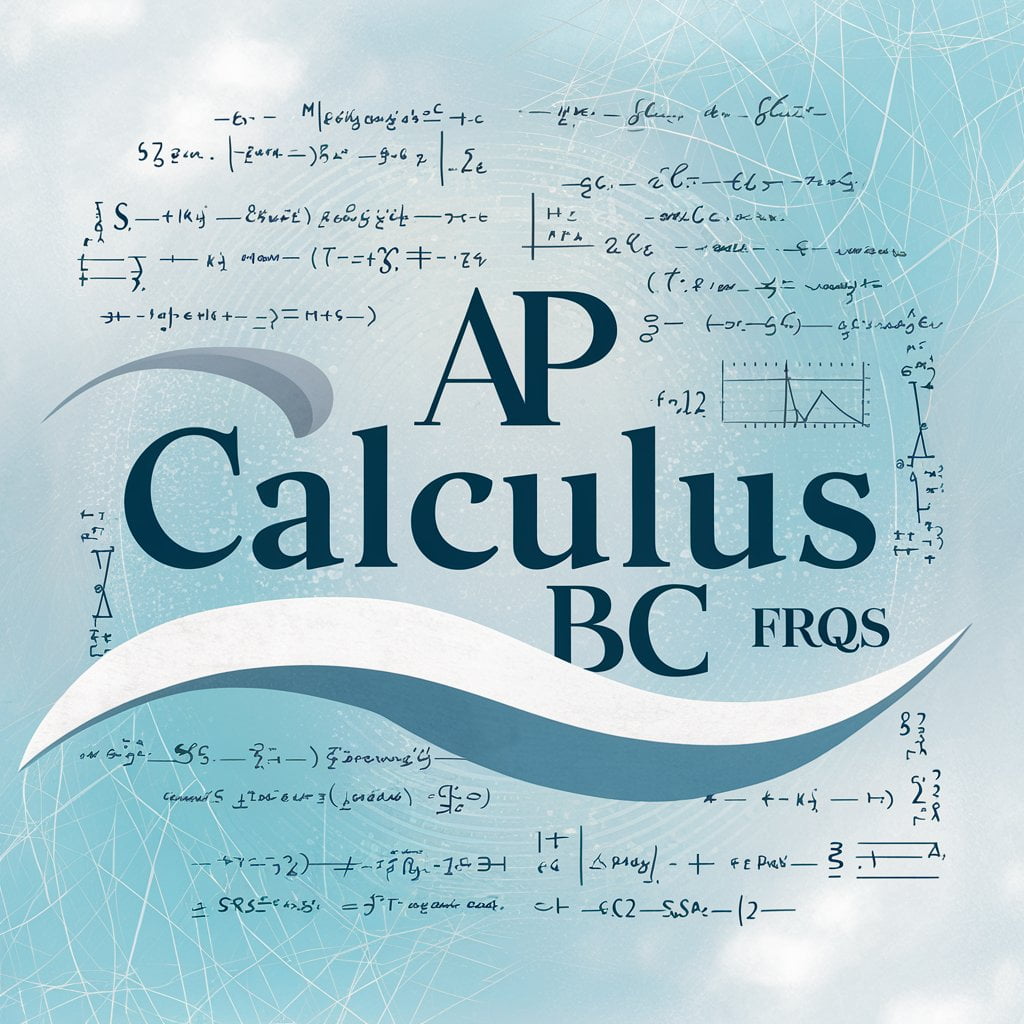- Brief Overview of AP Calculus BC and Role of the FRQ Section
- Understanding the AP Calculus BC Exam
- What to Expect in the FRQ Section
- Strategies for Tackling AP Calculus BC FRQs
- Understanding the FRQs landscape:
- Essential Resources for AP Calculus BC Preparation
- Additional Resources
- Frequently Asked Questions (FAQs)
- Conclusion
Brief Overview of AP Calculus BC and Role of the FRQ Section
AP Calculus BC is a demanding course designed to challenge high school students with college-level calculus concepts. It builds upon the foundation laid by AP Calculus AB, exploring topics such as infinite series, parametric, polar, and vector functions, as well as differential equations. For students aspiring to pursue majors in STEM fields or simply seeking to challenge themselves academically, AP Calculus BC serves as a gateway to higher-level mathematics.
One of the most critical components of the AP Calculus BC exam is the Free Response Questions (FRQ) section. These questions are designed to assess students’ ability to apply calculus concepts and techniques in various problem-solving scenarios. Mastering the FRQ section is essential for achieving a high score on the exam, as it comprises a significant portion of the overall grade.
Understanding the AP Calculus BC Exam
What is AP Calculus BC?
AP Calculus BC covers a wide range of topics in calculus, including limits, derivatives, integrals, and their applications. It goes beyond the scope of AP Calculus AB by introducing additional concepts such as parametric, polar, and vector functions, series and sequences, and differential equations. Students who perform well on the AP Calculus BC exam may earn college credit or advanced placement in calculus courses at many universities. If you are interested to know more about credits, checkout How are AP and College credits related?
Structure of the AP Calculus BC Exam
Just like AP Calc AB, The AP Calculus BC exam consists of two main sections: multiple choice and free response. The multiple-choice section contains a set number of questions covering various calculus topics and is timed accordingly. However, it is the free response section that often proves to be the most challenging and rewarding for students. This section includes a series of enquiry-based questions that require written responses, allowing students to demonstrate their understanding of calculus concepts in a more comprehensive manner.
| Aspect | Free Response Questions (FRQs) | Multiple Choice Questions (MCQs) |
| Number of Questions | 6 | 45 |
| Time Limit (minutes) | 90 | 105 |
| Contribution to Overall Exam (%) | 50 | 50 |
| Importance in Overall Performance | HIGH | HIGH |
| Purpose | Assess comprehensive understanding and application of calculus concepts | Test depth of knowledge and speed in answering calculus questions |
Check this out to get further insights about AP Calculus BC.
What to Expect in the FRQ Section
Types of Questions
The FRQ section of the AP Calculus BC exam typically includes questions on derivatives and integrals, series and sequences, parametric, polar, and vector functions, as well as differential equations. Let’s inquire into each category:
Derivatives and Integral
These questions may involve finding derivatives or integrals of functions, applying differentiation or integration rules, or solving related rates and optimization problems.
Series and Sequences
Students may encounter questions requiring them to work with Taylor or Maclaurin series, including determining convergence, finding specific terms, or representing functions as power series.
Parametric, Polar, and Vector Functions
These questions involve working with parametric equations, polar coordinates, or vector functions, often requiring students to find derivatives, integrals, or graphically represent these functions.
Differential Equations
Students may be asked to solve differential equations, sketch slope fields, or interpret the solutions to differential equations in real-world contexts.
Scoring Guidelines
Each FRQ question is graded according to specific scoring guidelines provided by the College Board. Points are awarded for correctly solving each part of the question, with partial credit given for incomplete or partially correct responses. It is crucial for students to show all their work and justify their answers to maximize their chances of earning full credit.
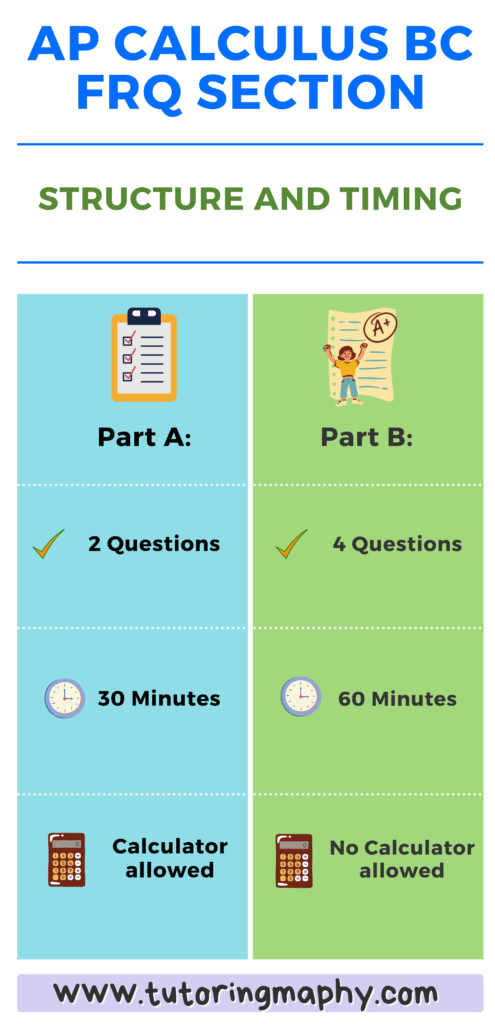
Key Topics to Focus On
Limits and Continuity
Understanding the fundamental concepts of limits and continuity is essential for success in AP Calculus BC. Students should be comfortable evaluating limits algebraically, graphically, and numerically, as well as identifying points of discontinuity.
Differentiation
Mastering differentiation involves not only knowing the basic rules but also applying them in various contexts such as related rates, optimization, and motion problems. Students should also be familiar with implicit differentiation and understanding the geometric interpretation of derivatives.
Integration
Integration techniques such as integration by parts, partial fractions, and numerical integration are crucial for solving a variety of problems involving area, volume, and accumulation. Students should also understand the applications of integrals in finding areas under curves, volumes of solids of revolution, and solving real-world problems.
Taylor Approximations and Series
Taylor and Maclaurin series provide powerful tools for approximating functions and solving differential equations. Students should be able to construct these series, find specific terms, and use them to approximate functions or represent functions as power series.
Differential Equations and Slope Fields
Solving separable and linear differential equations, as well as interpreting and sketching slope fields, are important skills in AP Calculus BC. Students should understand the relationship between a differential equation and its slope field and be able to sketch approximate solutions based on given initial conditions.
Strategies for Tackling AP Calculus BC FRQs
Successfully exploring the Free Response Questions (FRQs) section of the AP Calculus BC exam requires a combination of strong calculus skills, strategic planning, and effective time management. Here are some strategies to help you excel in this crucial part of the exam:
Reading and Understanding the Question
1. Read Carefully : Start by reading the entire question carefully to understand what is being asked. Pay attention to every detail, as missing a small piece of information can lead to incorrect solutions.
2. Identify Key Information : Highlight or underline key terms, values, and instructions within the question. This helps to focus your approach and ensure you address all parts of the question.
3. Break Down the Problem : Divide the problem into smaller, manageable parts. Tackling one part at a time can make complex questions seem less overwhelming and help you maintain clarity.
Showing Your Work Clearly
1. Step-by-Step Solutions : Present your solutions in a clear, logical sequence. Showing all steps not only helps in securing partial credit but also makes it easier to review your work.
2. Justify Your Answers : Always provide explanations or justifications for your steps and solutions. This demonstrates your understanding of the concepts and can earn you additional points.
3. Neatness Counts : Write legibly and organise your work neatly. Clearly labelled graphs, charts, and equations make it easier for graders to follow your reasoning.
Using Appropriate Notation
- Correct Mathematical Notation : Use standard calculus notation accurately. Misusing symbols or notation can lead to misunderstandings and loss of points.
- Label Everything : Ensure all variables, functions, and axes on graphs are properly labelled. This helps in communicating your solution clearly and avoids confusion.
- Units and Labels : Include units in your final answers where applicable, especially in applied problems involving real-world contexts.
Time Management Tips
- Pace Yourself : Allocate your time wisely among the questions. With 90 minutes for 6 FRQs, aim to spend about 15 minutes per question, leaving some buffer time for review.
- Prioritise Questions : Start with questions you find easier or are more confident in solving. This can help build momentum and ensure you secure those points early on.
- Move On When Stuck : If you’re stuck on a question, move on to the next one and come back to it later if time permits. This ensures you don’t waste too much time on a single problem.
Practice and Preparation Tips
- Using Past FRQs for Practice : Practice with actual past FRQs to familiarise yourself with the format and types of questions. Review scoring guidelines to understand how points are awarded.
- Mock Exams : Take full-length practice exams under timed conditions to simulate the test day experience. This helps in building stamina and managing exam anxiety.
- Review Mistakes : Analyse your mistakes on practice exams to identify areas for improvement. Understanding why you made errors can help you avoid them in the future.
Test Day Strategies
- What to Bring : Ensure you have all necessary materials, including pencils, a calculator, a valid ID, and any other resources permitted by the College Board.
- Stay Calm and Focused : Practise relaxation techniques such as deep breathing or mindfulness to stay calm during the exam. Keeping a clear head helps you think more logically and efficiently.
- Double-Check Your Work : If time permits, review your answers and ensure that you haven’t missed any parts of the questions. Double-check calculations and re-read questions to confirm you’ve answered them fully.
Common Mistakes and How to Avoid Them
- Misreading the Question : Carefully read each question to understand exactly what is being asked. Avoid jumping to conclusions or making assumptions without verifying the details.
- Forgetting to Simplify Answers : Always simplify your final answers where possible. Unnecessarily complex or unsimplified answers can lead to errors and loss of points.
- Errors in Calculations : Be attentive in your calculations, and consider using estimation techniques to verify the reasonableness of your answers. Double-check key steps, especially in long or complex problems.
- Misusing Calculus Concepts : Ensure you understand the calculus principles applicable to each problem. Misapplying rules or concepts can result in significant errors. Practice applying these concepts in varied contexts to build versatility and confidence.
Utilising Resources Effectively
- Online Resources : Use websites likeTutoringmaphy, Khan Academy and College Board AP Classroom for additional practice and explanations of difficult concepts.
- Study Group : Collaborate with peers in study groups to discuss and solve practice problems. Teaching concepts to others can also reinforce your own understanding.
- Seek Help from Teachers and Tutors : Don’t hesitate to ask your teacher or a tutor for help if you’re struggling with particular topics. They can provide valuable insights and additional practice problems.
By incorporating these strategies into your preparation and practice, you can enhance your performance on the FRQ section of the AP Calculus BC exam. Consistent practice, clear problem-solving methods, and effective time management will be key to achieving a high score.
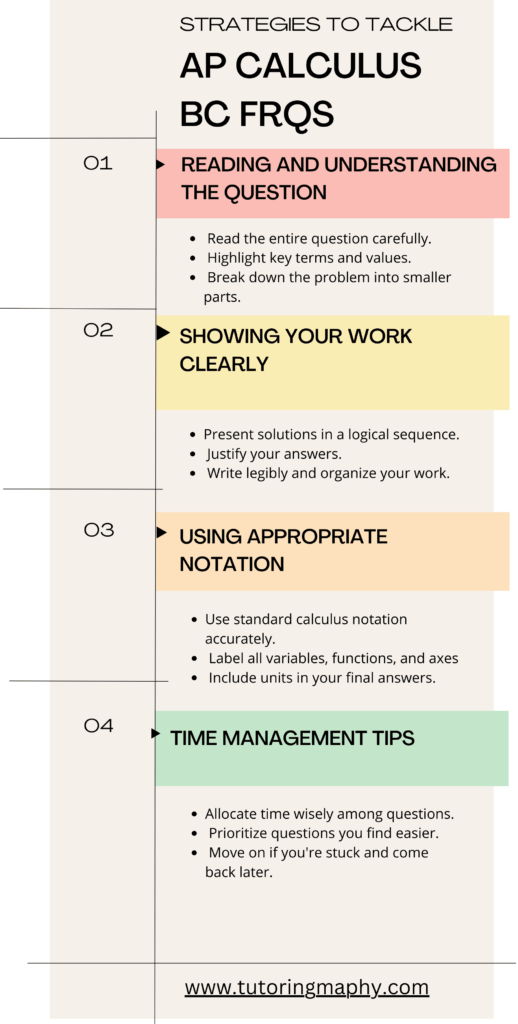
Understanding the FRQs landscape:
Sample Questions:
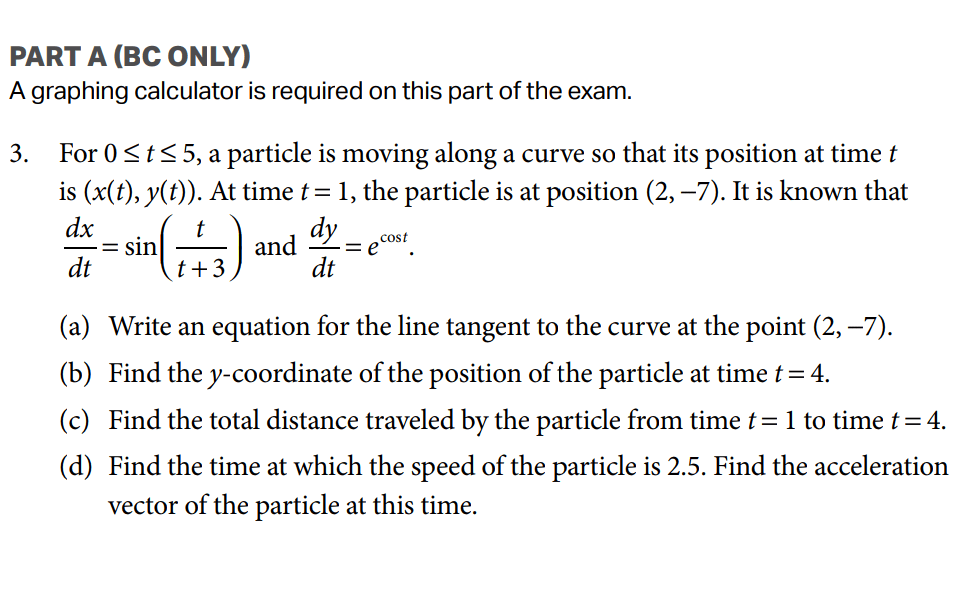
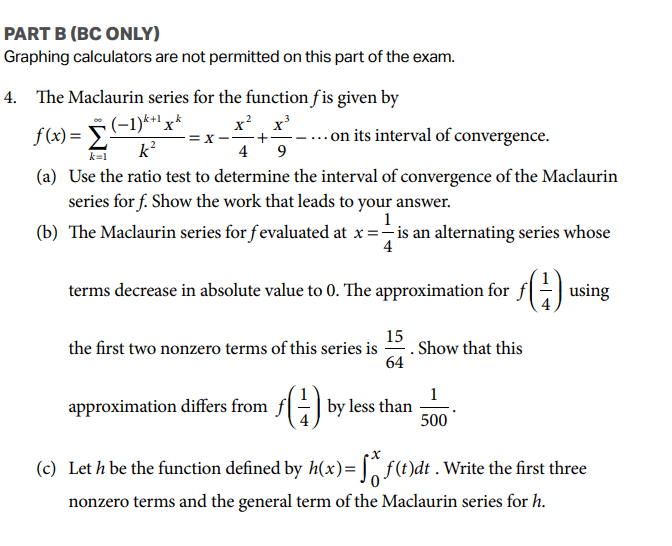
Essential Resources for AP Calculus BC Preparation
Preparing for the AP Calculus BC exam, especially for Free-Response , requires a strategic approach, including comprehensive study materials, practice exams, and effective study aids. Below is a detailed guide to some of the most valuable resources available:
Textbooks
Multiple-Choice and Free-Response Questions in Preparation for the AP Calculus (BC) Examination by David Lederman and Lin McMullin : This classic resource provides a vast collection of practice problems, including multiple-choice questions and free-response questions that cover all areas of the AP Calculus BC curriculum.
Calculus: Early Transcendentals (AP Edition) by Ron Larson, Bruce H. Edward s: While not a book specifically focused on FRQs, this is a comprehensive and well-regarded calculus textbook that covers all the topics tested on the AP exam. Working through the practice problems in this book can help you solidify your understanding of the concepts and prepare you for the challenges of the FRQs.
Online Resources and Practice Tools
1. Tutoringmaphy
- Website: Tutoringmaphy]
- Description : Offers free, comprehensive video tutorials and practice exercises aligned with the AP Calculus BC curriculum.
- Features : Video tutorials, interactive practice problems, and personalised learning paths.
2. College Board AP Classroom
- Website : [AP Classroom]
- Description : The official College Board resource provides practice questions, progress checks, and previous years’ FRQs.
- Features : Practice exams, progress tracking, and access to past exam questions with scoring guidelines.
3. Practice Exams and Past FRQs
AP Central – College Board
- Website : [AP Central]
- Description : Provides access to past AP Calculus BC exams, including multiple-choice and FRQ sections, which are crucial for understanding the exam format and question types.
- Features : Past exam questions, scoring guidelines, and sample responses.
4. Stewart Calculus (Book)
- Website : [click here to download pdf]
- Description :Offers a large collection of practice questions categorised by topic and difficulty level, with detailed explanations.
- Features : Topic-specific practice questions, detailed and interactive explanations.
5. Study Groups and Tutoring
Study Groups
- Description : Collaborative learning with peers to discuss difficult concepts, solve problems together, and share resources.
- Benefits : Peer support, collaborative problem-solving, and diverse perspectives.
Tutors
- Description : Personalised instruction and targeted practice from experienced educators to clarify concepts and improve problem-solving skills.
- Finding Tutors : Available through schools, local tutoring centres, or online platforms such as Tutoringmaphy
6. Online Communities and Forums
Reddit – r/APStudents and r/AP_Calculus
- Website : [r/APStudents] and [r/AP_Calculus]
- Description : Subreddits where students can find study tips, ask questions, and share resources related to AP Calculus BC.
- Features : Community support, study tips, and shared resources.
College Confidential AP Calculus BC Forum
- Website : [College Confidential]
- Description : A forum for discussing exam strategies, sharing resources, and asking questions about AP Calculus BC.
- Features : Discussion threads, study tips, and resource sharing.
7. Apps and Interactive Tools
Wolfram Alpha
- Website : [Wolfram Alpha]
- Description : A computational engine that solves calculus problems, provides step-by-step solutions, and visualises complex functions.
- Features : Step-by-step solutions, graphing tools, and interactive problem-solving.
2. Desmos
- Website : [Desmos]
- Description : An intuitive graphing calculator tool useful for visualising functions and exploring calculus concepts interactively.
- Features : Graphing calculator, interactive simulations, and educational activities.
Additional Resources
– Description : A review book designed specifically for AP Calculus preparation, including content review, practice exams, and test-taking strategies.
– Features : Practice exams, review sections, and tips for tackling the exam.
– Description : Another comprehensive review book offering detailed content review, practice questions, and strategies designed for the AP Calculus BC exam.
– Features : Full-length practice tests, detailed explanations, and review chapters.
By taking advantage of these resources, you can deepen your understanding of AP Calculus BC concepts, enhance your problem-solving abilities, and build confidence for the exam. Consistent practice, along with the support of these tools and communities, will be key to achieving a high score on the AP Calculus BC exam.
Frequently Asked Questions (FAQs)
Q. How Many FRQs Are on the AP Calculus BC Exam?
The AP Calculus BC exam includes a total of 6 Free Response Questions (FRQs). These questions are divided into two parts:
- Part A : This part consists of 2 questions that must be answered without the use of a calculator. You are given 30 minutes to complete this section.
- Part B : This part consists of 4 questions where the use of a graphing calculator is permitted. You are given 60 minutes to complete this section.
Q. How to Prepare for FRQs on AP Calculus BC?
Preparing for the FRQs on the AP Calculus BC exam involves several key steps:
- Understand the Format and Expectations :
- Familiarise yourself with the types of questions typically asked in the FRQ section. These may include problems on derivatives, integrals, series, differential equations, and parametric, polar, or vector functions.
- Review the scoring guidelines to understand how points are awarded, emphasising the importance of showing your work and using correct mathematical notation.
- Practice Regularly :
- Work on past FRQs available from the College Board or other reputable sources. This helps you get used to the format and the level of difficulty of the questions.
- Timed practice sessions can help you manage your time effectively during the actual exam.
- Seek Clarification and Help :
- Join study groups or seek help from a tutor to discuss difficult concepts and problems.
- Use online resources like video tutorials and interactive problem-solving tools to strengthen your understanding.
- Review and Learn from Mistakes :
- After practising, carefully review your solutions and compare them with the provided scoring guidelines. Understand where you made mistakes and learn how to correct them.
- Focus on areas where you consistently lose points and target those for further study.
Q. How Long is the AP Calculus BC FRQ Section?
The total time allocated for the FRQ section of the AP Calculus BC exam is 90 minutes. This is divided into two parts:
- Part A (30 minutes) : 2 questions, no calculator allowed.
- Part B (60 minutes) : 4 questions, calculator permitted.
Q. Can I Get Past Exam FRQs for AP Calculus BC?
Yes, you can access past exam FRQs for AP Calculus BC. Here are some reliable sources:
- College Board AP Central :
- The College Board’s AP Central website provides access to past FRQs along with scoring guidelines and sample responses. This is a primary and authoritative source.
- [AP Central FRQ Archive]
- AP Review Books :
Many AP review books, such as those by Barron’s and Princeton Review, include past FRQs and practice questions modelled after past exams. These books often provide explanations and tips for tackling each type of question.
By using these resources, you can access a wealth of practice material that will help you become familiar with the types of questions you might encounter on the exam and improve your problem-solving skills.
Conclusion
Preparing for the AP Calculus BC exam, especially the Free Response Questions (FRQs), demands a strategic approach and thorough practice. Understanding the exam format and practising with past FRQs are essential. Leveraging resources like textbooks, online tutorials, and tutoring services can reinforce your understanding.
Utilising TutoringMaphy.com’s resources , can greatly aid your preparation. With dedication and consistent practice, you can master the FRQs and achieve success on the exam. Remember, persistence and effective use of resources are key to excelling in AP Calculus BC.
Are you struggling to decide between AP Calculus AB and BC? Check out this article to get further guidance on AP Calculus AB or BC – Which one to take?

